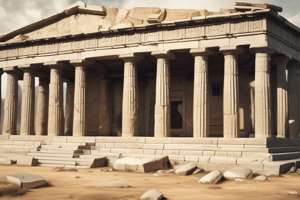Podcast
Questions and Answers
Which historical period saw the emergence of holy women challenging traditional gender roles in ancient Greek society?
Which historical period saw the emergence of holy women challenging traditional gender roles in ancient Greek society?
- Ottoman Occupation
- Twentieth Century
- Roman Empire
- Byzantium (correct)
What impact did education campaigns during the Ottoman Occupation have on women's emancipation efforts in Greece?
What impact did education campaigns during the Ottoman Occupation have on women's emancipation efforts in Greece?
- Contributed significantly to women's emancipation efforts (correct)
- Hindered women's emancipation
- Led to a decline in female rights
- No impact
In which context did women play pivotal roles either directly in armed resistance or indirectly by supporting revolutionary activities?
In which context did women play pivotal roles either directly in armed resistance or indirectly by supporting revolutionary activities?
- Ottoman Occupation (correct)
- Roman Empire
- Twentieth Century
- Byzantium
How did democracy taking root in postwar Greece impact the struggle for women's rights?
How did democracy taking root in postwar Greece impact the struggle for women's rights?
Which historical period saw groundbreaking figures like Eleni Zouni and Kiki Dikou demanding justice for gender equality in Greece?
Which historical period saw groundbreaking figures like Eleni Zouni and Kiki Dikou demanding justice for gender equality in Greece?
What is the significance of maintaining balanced scales and practicing equitable judgment for those professing faith in God?
What is the significance of maintaining balanced scales and practicing equitable judgment for those professing faith in God?
From the verse [3:104-110], what responsibilities are emphasized as crucial for those working toward the common good according to the Quran?
From the verse [3:104-110], what responsibilities are emphasized as crucial for those working toward the common good according to the Quran?
What message does the Quran convey about individuals' accountability for justice in the Hereafter?
What message does the Quran convey about individuals' accountability for justice in the Hereafter?
How does the text suggest individuals can prepare themselves for the encounter with the divine Creator?
How does the text suggest individuals can prepare themselves for the encounter with the divine Creator?
What role does self-reflection play in individual efforts to attain spiritual growth, as highlighted in the Quran?
What role does self-reflection play in individual efforts to attain spiritual growth, as highlighted in the Quran?
Flashcards are hidden until you start studying
Study Notes
Patriarchy in Ancient and Modern Greek Societies
A fascinating journey awaits us as we delve into patriarchal structures across centuries of Greek culture – from the ancient world to our present day. To unravel this complex narrative, we'll explore how these social hierarchies have evolved overtime and their tangible influence within both political power dynamics and cultural norms.
Antiquity: A Matriarchal Beginning?
Initially, as we peer back into history's lens, the foundations of Greek civilization may seem to contradict conventional notions of patriarchy; evidence suggests a prehistoric matrilineal society. In Mycenaean Greece around 1500 BC, archaeological findings hinted towards inheritance through female lineage, signaling a possible ancestral role reversal where women held more prominent societal positions.
However, by Classical times, specifically during the Archaic Period (ca. 700–480), male dominance became firmly established through legal codification such as Solonian laws of Athens, which solidified property rights for men while restricting them for women. This discrimination persisted throughout Greek antiquity until the Hellenistic era when Roman rule led to additional changes.
Hellenistic Era & Macedonia: An Exception to the Rule?
The emergence of powerful female figures like Olympias and Cleopatra Eurydice, queens of Macedonia, cast doubt upon traditional views of Greek societies as exclusively patriarchal. Their influences extended beyond the Balkans and furthered throughout the Mediterranean, potentially challenging the rigid gender roles common among neighboring city-states such as Sparta and Corinth. Unfortunately, the longevity and broad impact of these exceptions remain debated among scholars.
Byzantium: Revival with Subtle Changes
In the aftermath of Rome's decline, the Eastern Roman Empire rose, later known as Byzantium. Although patriarchy was reinforced in many aspects, it underwent subtle shifts due to new cultures intermingling and the Christianization of Greco-Roman culture. For example, the rise of holy women, called saintly monastics, demonstrated an emerging form of spiritual empowerment previously absent within ancient Greek society.
Ottoman Occupation: Female Resistance and Emancipation Efforts
During the prolonged occupation of Greece under the Ottomans, women played pivotal roles either directly in armed resistance movements or indirectly by supporting revolutionary activities – defying stereotypes regarding their limited social status. Moreover, education campaigns initiated during this period contributed significantly to women's emancipation efforts following liberation.
Twentieth Century: Resurgence of Women's Rights and Cultural Shifts
As democracy took root in postwar Greece, women spearheaded the struggle for equal suffrage and other fundamental rights. Groundbreaking figures such as Eleni Zouni and Kiki Dikou exerted influential voices demanding justice amidst a conservative backdrop, eventually leading to legislative reforms and broader cultural acceptance.
Today, while considerable progress has been achieved in uprooting vestiges of archaic patriarchy, contemporary issues of gender disparities still arise, especially in traditionally male-dominated fields. As we honor those who paved paths to equality, we must also endeavor to continue dismantling barriers throughout every aspect of Greek society.
Studying That Suits You
Use AI to generate personalized quizzes and flashcards to suit your learning preferences.



